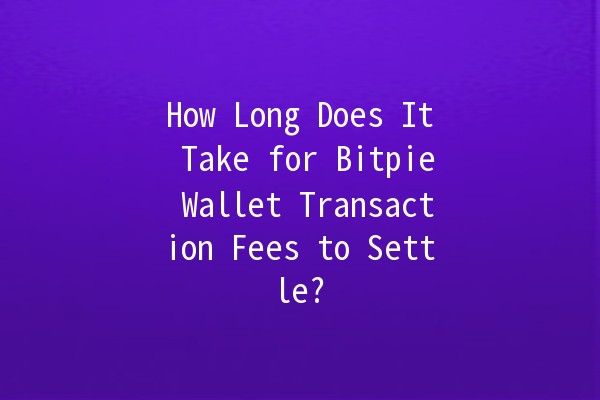




When it comes to using cryptocurrency wallets, one of the most frequent concerns users face is understanding transaction fees and their settlement periods. Bitpie Wallet, a popular choice among cryptocurrency enthusiasts, is no exception. This article aims to provide a comprehensive understanding of how long it takes for Bitpie Wallet transaction fees to settle, along with practical tips to enhance your productivity while using the wallet.
Transaction fees are fees charged by cryptocurrency networks to process and confirm transactions. These fees can vary based on network congestion and the speed at which the user wants their transaction to be confirmed. For Bitpie Wallet users, understanding these fees is crucial for efficient management of their cryptocurrency transactions.
Bitpie Wallet is designed to provide a userfriendly interface for storing and managing cryptocurrencies. It offers features such as multisignature security and the ability to store multiple cryptocurrencies, which inherently involves transaction fees during transfers.

One primary factor influencing transaction fee settlement times is network congestion. When many users are sending transactions simultaneously, the network becomes congested, leading to longer confirmation times and potentially higher fees. Users can monitor network activities through various blockchain explorers to gauge the best times to execute transactions.
The settlement period for transaction fees in Bitpie Wallet can vary based on several factors:
Different transaction types (e.g., sending coins between wallets, exchange transfers) might have different fee structures and settlement times. Generally, transfers within the same blockchain network tend to settle faster than transactions involving exchanges.
Typically, under average network conditions, a transaction can take anywhere from a few minutes to several hours to settle. For major cryptocurrencies like Bitcoin, this timeframe can range from 10 minutes to 1 hour on average, but during peak times, it can easily push beyond that.
Bitpie Wallet allows users to set their transaction fees. Higher fees usually result in faster settlement times because miners prioritize transactions with higher fees. Conversely, lower fees may result in a longer wait for confirmation.
Different cryptocurrencies require different numbers of confirmations for a transaction to be considered settled. For instance, Bitcoin commonly requires 6 confirmations, while other cryptocurrencies may only need 1 to
Managing transaction fees effectively is crucial for a smooth cryptocurrency experience. Here are some productivityenhancing tips to optimize your use of Bitpie Wallet:
Keeping an eye on market conditions can help you choose the right time to execute transactions. Use tools like block explorers or realtime fee estimators to get insights into current network congestion.
If you're planning to transfer Bitcoin and notice that transaction fees are currently low, it might be a good time to initiate the transfer to avoid higher costs later.
Bitpie Wallet allows you to customize your transaction fees. Use this feature to adjust fees based on urgency – if a transaction is urgent, consider setting a higher fee to speed up the process.
If you're transferring funds to an exchange to capitalize on a price jump, setting a high fee can ensure your transaction gets prioritized.
For those who frequently make multiple transactions, batching them together can save on fees. By combining several transactions into one, you will only pay a single fee instead of multiple fees.
Instead of sending individual payments to multiple recipients, group them and send them in one transaction where possible.
Not all cryptocurrencies have the same transaction fees or settlement times. Research which cryptocurrencies are efficient for the type of transactions you often perform.
If you routinely make small transactions and find Bitcoin fees high, consider using Litecoin or Bitcoin Cash, which often offer lower fees and faster transaction times.
Cryptocurrency networks often undergo changes in protocol, impacting transaction fees and their settlement times. Stay informed through news articles, social media, or community forums.
If a particular cryptocurrency is set to undergo a network upgrade aimed at reducing fees, plan your transactions accordingly to take advantage of the upcoming enhancements.
Several factors influence transaction fees, including network congestion, the type of transaction, the cryptocurrency in question, and the fee that the user sets. Understanding these elements can help optimize costs.
Once a transaction has been submitted to the network, users typically cannot change the transaction fee. However, if a transaction is pending and uses a low fee, it may be possible to cancel it and resend with a higher fee.
Bitpie Wallet does not charge hidden fees, but users must be aware of the transaction fees associated with the cryptocurrency networks themselves. Always check the specific fee structure for the cryptocurrency you're dealing with.
You can estimate transaction fees by checking realtime fee estimators available through various blockchain explorers and analyzing the current network congestion.
Yes, transaction fees vary significantly across different cryptocurrencies. It is essential to understand the fee structure of each cryptocurrency being used in Bitpie Wallet.
If the transaction fee is too low, your transaction may remain unconfirmed for an extended time or may even be dropped by the network. You may need to resend the transaction with a higher fee for it to be processed.
By understanding the factors that influence transaction fee settlement times in Bitpie Wallet, you can make informed decisions, enhance your cryptomanagement skills, and ensure a smoother transaction process.